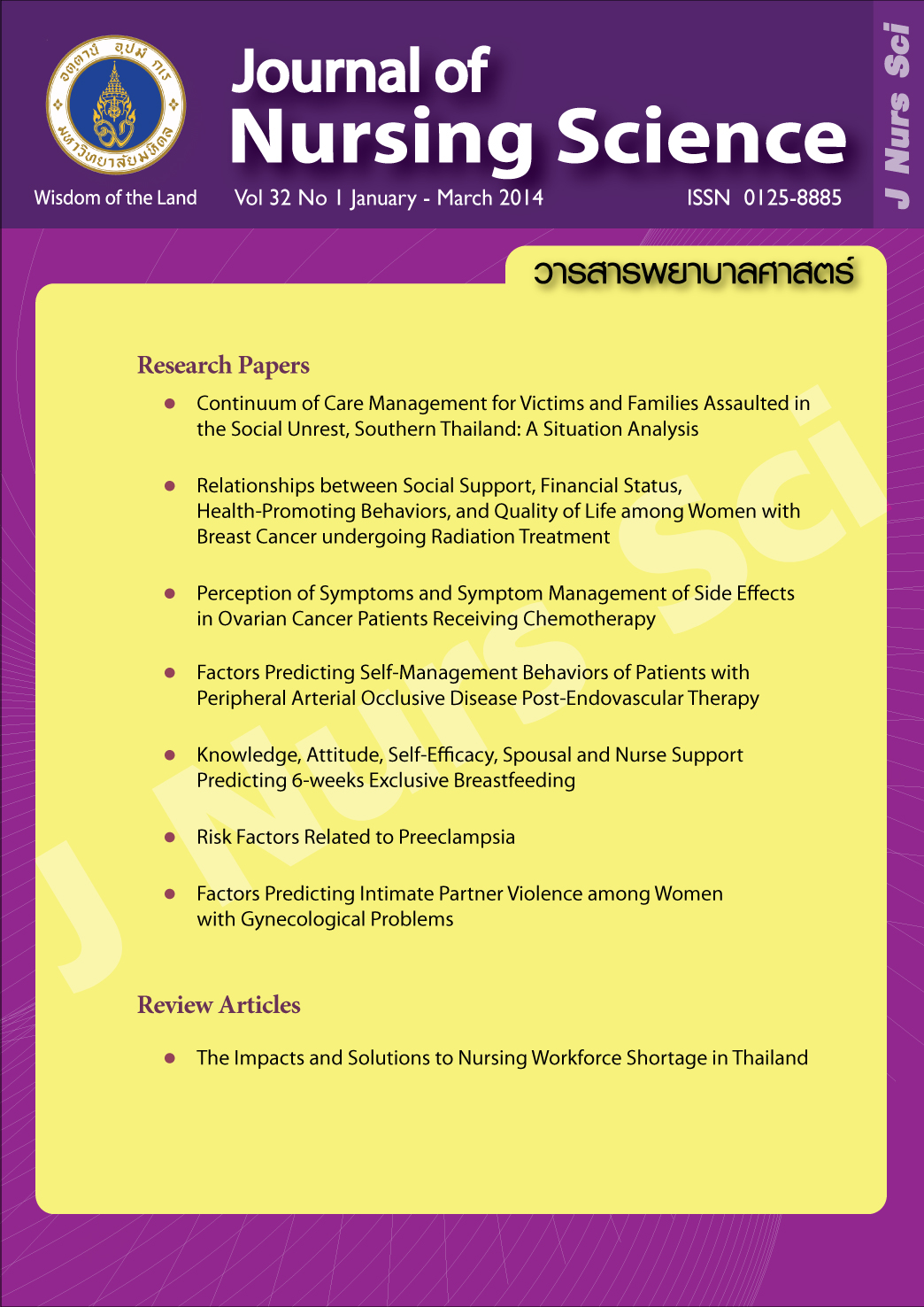Factors Predicting Self-Management Behaviors of Patients with Peripheral Arterial Occlusive Disease Post-Endovascular Therapy
Main Article Content
Abstract
Purpose: To determine the predictive power of fatigue, illness perception, and patient-provider communication on self-management behaviors of patients with peripheral arterial occlusive disease post-endovascular therapy.
Design: A correlational predictive design.
Methods: The sample consisted of 78 patients with peripheral arterial occlusive disease who had undergone endovascular therapy and came for follow up at the out-patient department and the Special Medical Instrument for Treatment and Follow-up Unit, Siriraj Hospital. The interviews were used for data collection. The interview data forms included demographic characteristics, self-management behaviors, the Revised Piper Fatigue Scale, patient-provider communication, and the Brief Illness Perception questionnaire. The data were analyzed using multiple regression analysis.
Main findings: Self-management behaviors of subjects were good (X = 3.85, SD = .37). Fatigue, illness perception, and patient-provider communication could jointly predict 10% of self-management behaviors of the subjects (R2 = .10, p < .05). Fatigue was the only factor that could significantly predict self-management behaviors of patients with peripheral arterial occlusive disease post-endovascular therapy (β = - .303, p < .05).
Conclusion and recommendations: Nurses should pay more attention to the problem of fatigue in patients with peripheral arterial occlusive disease. Nurses should assess fatigue level and promote fatigue management during pre-post therapy and follow up period. Moreover, researchers should examine others factors that may influence self-management behaviors, for instance, understanding of information and family support.
Keywords: self-management behaviors, fatigue, post-endovascular therapy
ปัจจัยทำนายพฤติกรรมการจัดการตนเองของผู้ป่วยหลอดเลือดแดงส่วนปลายตีบตัน ภายหลังได้รับการรักษาผ่านทางสายสวนหลอดเลือดแดง
บทคัดย่อ
วัตถุประสงค์: เพื่อศึกษาอำนาจการทำนายของอาการอ่อนล้า การรับรู้ความเจ็บป่วย การสื่อสารระหว่างผู้ป่วยกับเจ้าหน้าที่สุขภาพ ต่อพฤติกรรมการจัดการตนเองของผู้ป่วยหลอดเลือดแดงส่วนปลายตีบตัน ภายหลังได้รับการรักษาผ่านทางสายสวนหลอดเลือดแดง
รูปแบบการวิจัย: การศึกษาความสัมพันธ์เชิงทำนาย
วิธีการดำเนินการวิจัย: กลุ่มตัวอย่างเป็นผู้ป่วยหลอดเลือดแดงส่วนปลายตีบตันซึ่งได้รับการรักษาผ่านทางสายสวนหลอดเลือดแดง และมาติดตามการตรวจรักษาที่หน่วยตรวจโรคผู้ป่วยนอกและหน่วยตรวจรักษาด้วยเครื่องมือพิเศษและติดตามผล ณ โรงพยาบาลศิริราช จำนวน 78 ราย เก็บรวบรวมข้อมูลโดยการสัมภาษณ์ เครื่องมือที่ใช้ในการเก็บข้อมูล ได้แก่ แบบสัมภาษณ์ข้อมูลทั่วไป พฤติกรรมการจัดการตนเอง อาการอ่อนล้า การสื่อสารระหว่างผู้ป่วยกับเจ้าหน้าที่สุขภาพ และการรับรู้ความเจ็บป่วยฉบับย่อ วิเคราะห์ข้อมูลด้วยสถิติการถดถอยพหุคูณ
ผลการวิจัย: กลุ่มตัวอย่างมีพฤติกรรมการจัดการตนเองอยู่ในระดับดี (X = 3.85, SD = .37) อาการอ่อนล้า การรับรู้ความเจ็บป่วย และการสื่อสารระหว่างผู้ป่วยกับเจ้าหน้าที่สุขภาพ ร่วมกันทำนายพฤติกรรมการจัดการตนเองของกลุ่มตัวอย่าง ได้ร้อยละ 10 (R2 = .10, p < .05) โดยมีอาการอ่อนล้าเพียงตัวแปรเดียวที่สามารถทำนายพฤติกรรมการจัดการตนเองของผู้ป่วยหลอดเลือดแดงส่วนปลายตีบตัน ภายหลังได้รับการรักษาผ่านสายสวนได้อย่างมีนัยสำคัญทางสถิติ (β = - .303, p < .05)
สรุปและข้อเสนอแนะ: พยาบาลควรให้ความสำคัญต่อปัญหาอาการอ่อนล้าของผู้ป่วยหลอดเลือดแดงส่วนปลายตีบตันโดยควรประเมินอาการอ่อนล้าและส่งเสริมการจัดการกับอาการอ่อนล้าเป็นระยะๆ ตั้งแต่ระยะก่อนและหลังรับการรักษาจนถึงระยะที่มาตรวจติดตามการรักษา ในการศึกษาครั้งต่อไป ผู้วิจัยควรศึกษาปัจจัยอื่นที่มีอิทธิพลต่อพฤติกรรมการจัดการตนเอง เช่น ความเข้าใจในข้อมูลที่ได้รับ และการสนับสนุนจากครอบครัว เป็นต้น
คำสำคัญ: พฤติกรรมการจัดการตนเอง อาการอ่อนล้า การรักษาผ่านทางสายสวนหลอดเลือดแดง
Article Details
Copyright Notice: Nursing Science Journal of Thailand has exclusive rights to publish and distribute the manuscript and all contents therein. Without the journal’s permission, the dissemination of the manuscript in another journal or online, and the reproduction of the manuscript for non-educational purpose are prohibited.

Disclaimer: The opinion expressed and figures provided in this journal, NSJT, are the sole responsibility of the authors. The editorial board bears no responsibility in this regard.


